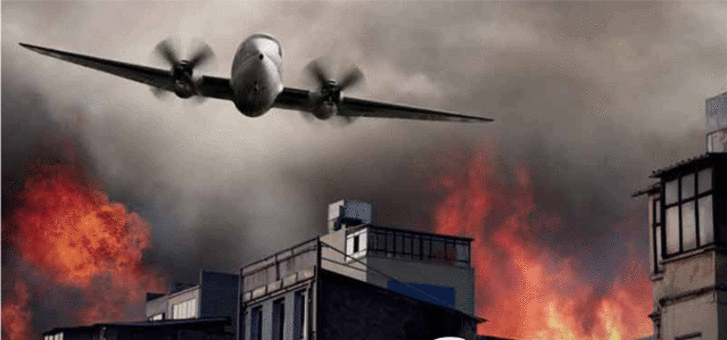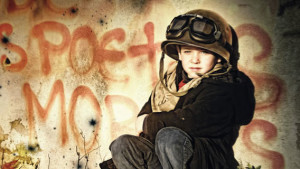It happened on Wednesday, September 1, 2004. The large clock on the central building of the primary school announced that it was nine-forty in the morning. It was a typical summer day. In the school, the students, teachers and parents were getting ready to start a program called the "Day of Knowledge."
Suddenly, shots rang out, followed by cursing, threats and blows. Seconds later, 32 men and women, armed to the teeth, their faces covered by black hoods, seized control of the school. Soon they held more than 1100 hostages, the majority of them children.
This infamous incident occurred in the town of Beslan, south of the Russian Federation. The invaders marched their captives to the school gymnasium, where they laid out an enormous quantity of explosives to protect themselves in case of an attack by government forces. The special security forces of the national army quickly surrounded the school and prepared to rush in at the first careless move by the terrorists. The standoff ended three days later with the deaths of at least 334 people, including 186 children. Hundreds more were injured. War had spilled into the hostages' peaceful school.
Terrorism and violence
Jesus said it a long time ago: "You will hear of wars and rumours of wars" (Matthew 24:6). It was one of the signs He gave that would announce His approaching return to planet Earth. This incident is just one drop in an increasing torrent of violence. People fight and kill without reason every day.
We've grown accustomed to living in a climate of constant hostility. The wars in Iraq and Afghanistan have cost thousands of lives, both military personnel and innocent people, most of whom had nothing to do with the political issues involved. At first, everyone avidly followed the events of these conflicts. Now, in spite of the deaths of dozens every day, people have lost interest. This has become so routine that no-one pays attention anymore.
Someone once asked me, "Haven't there always been wars since human beings appeared on earth? Didn't Cain kill his brother Abel? How can 'wars and rumours of wars' be a sign of the Second Coming?"
It is true, of course, that violence has been around for a long time. Since the entrance of sin, most people have lived in a climate of war, which is the result of our human estrangement from God. However, never in history has there been as much tension and violence as exists today.
The 20th Century was shaken by two global conflicts and several more localised ones. Up until that time the world had never seen such devastation. World War I killed between nine and 16 million people, depending on the authority one cites. And, depending on the source, World War II killed as many as 73 million!
Internal conflict
While wars between wealthy countries dominated the first half of the past century, the majority of today's conflicts take place among the poorest countries of the world. Nations that can't even feed themselves now squander their most precious resources, fighting citizen against citizen.
Studies by specialists show a definite relationship between armed conflict and world hunger. One problem leads to another. Financial recessions throw millions of people into misery, and hunger follows natural disasters and wars.
In our day, many countries suffer from internal conflicts led by so-called revenge guerillas. Internal conflicts generally take place in rural areas, where subsistence farmers bear the disastrous consequences. Those who hurt the most are the least responsible for what is happening.
The various factions force young people to join the fighting, removing them from the productive sector of society. The resulting increase in hunger remains long after the violence has passed. What can be done in a land in which goods have been destroyed, people have been killed and wounded, the population has fled to escape the danger and damage to the environment has become irreparable?
Even worse are the land mines scattered across the land, which kill and maim people, discouraging farming for decades after a conflict has ceased.
Hopes of peace
After World War II, arms expenditures dropped dramatically and people talked of international peace and harmony. But it all turned out to be temporary! Prophecy had foretold that "while people are saying, 'Peace and safety,' destruction will come on them suddenly" (1 Thessalonians 5:3). And it was true. In the past 20 to 30 years, arms sales around the world have grown out of control, amounting to upwards of $1.5 billion. That's 15 to 20 times more than the total spent on humanitarian and other aid. Even worse, the expenditure was the greatest in the poorest countries of the world.
And while you may live in a city in which guerilla activity doesn't exist, you may be subject to another type of violence. Do you hesitate to go into dark places when night comes, even around your own neighbourhood? Are there areas in your city that you wouldn't want to venture into even by day? Urban violence, the other unending war, is a constant part of the experience of people who live in the big cities of the world.
In Brazil, 240,000 people have died in its violent streets during a recent five-year period. Organised crime has succeeded in paralysing an entire megalopolis, killing 20 police officers a day. Truck hijacking has a stranglehold on the roads, drug traffickers control the poorer neighbourhoods and arms trafficking and contraband are rampant. All of this generates panic among the citizens. Nevertheless, the country is "not at war."
We see the words of Jesus being fulfilled on a daily basis. Wars and rumours of wars, fratricidal conflicts and senseless destruction take place everywhere. Thinking men and women are trying to understand what is happening, but they can't make sense of it.
In the midst of the whirlwind of struggles and affliction, listen to the gentle voice of Jesus: "Peace I leave with you; my peace I give you. I do not give to you as the world gives. Do not let your hearts be troubled and do not be afraid" (John 14:27). During this time of conflict and war in which we live, there could never be a better invitation.
Adapted, with permission, from Signs of Hope, Review and Herald





